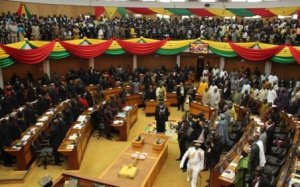Following the Supreme Court’s ruling on the Waterville Holdings Limited, which faulted the company for bypassing parliament to execute a contract that did not have parliamentary approval, the nation’s parliament yesterday constituted an ad hoc committee to look at portions of the 1992 Constitution on international transactions and make recommendations for implementation to avoid a recurrence of such unconstitutional act.
The members of the ad hoc committee are National Democratic Congress (NDC) Member of Parliament for Nandom and Majority Leader, Dr Benjamin Kunbuor; New Patriotic Party (NPP) Member of Parliament for Suame and Minority Leader, Osei Kyei Mensah Bonsu; NDC MP for Cape Coast North and first Deptuty Speaker, Ebo Barton Odro; NPP MP for Essikado/Ketan and second Deputy Speaker, Joe Ghartey; NDC MP for Nadowli/Kaleo, Alban Bagbin; NDC MP for Zebilla, Cletus Avoka; NPP MP for Sekondi, Papa Owusu-Ankomah; NDC MP for Ketu North, James Klutse Avedzi and NPP MP for Old Tafo, Dr Anthony Akoto Osei.
The rest of the members are NDC MP for Ashaiman and Deputy Majority leader, Alfred Kwame Agbesi; NPP MP for Akuapem North, William Ofori Boafo; NDC MP for Kpando, Della Sowah; -NPP MP for Dome/Kwabenya, Sarah Adwoa Safo; NPP MP for Bekwai, Joseph Osei-Owusu and NDC MP for Agona West, Charles Obeng-Inkoom
The committee is to look at Article 181 of the 1992 Constitution, especially clause five which talks about the power of parliament to look at modifications in relations to international business or economic transaction and make the necessary recommendations to parliament for adoption.
Clause five of Article 181 of the 1992 Constitution, which falls under the broad category of loans, says that this article with the necessary modification by parliament, applies to an international business or economic transactions to which the government is a party as it applies to a loan.
Clause one of Article 181 under sub-heading ‘Loans’ states that parliament may, by a resolution supported by the votes of a majority of all the members of parliament, authorise the government to enter into an agreement for the granting of a loan out of any public fund or account while clause two of the same Article states that an agreement entered into clause (1) of this article shall be laid before parliament and shall not come into operation unless it is approved by a resolution of parliament.
The Supreme Court’s in its ruling on Waterville advised parliament to look at the knotty area of modifications in relations to international economic transactions because it is a loophole where the executive can capitalise on and that apart from the Waterville case, the Supreme Court had dealt with two similar cases in the past and made similar recommendations.
Contributing to the motion that gave birth to the ad hoc committee, the Minority Leader, Osei Kyei Mensah Bonsu, said the time had come for parliament to live up to its expectation and protect the public purse.
He said even though such a move had been long overdue, the initiative by the sixth parliament of the Fourth Republic to address this issue was a landmark one.
He said it had become imperative to give meaning to the provision and, therefore, a report by the committee would definitely be adopted for the benefit of the nation.
According to him, the leadership thought deeply to include experienced MPs, some of whom had been Attorney-General’s before, in the adhoc committee.
“We have very experienced MPs, some former leaders of the house and Attorney-General’s, with most of them being lawyers” he said, adding that the chairman and ranking member of the finance committee had also been included and; therefore, parliament expected they would do a thorough job and present it for adoption.
The NPP MP for Akwapim North, William O. Boafo, who is a member of the committee, proposed to the house that after the committee had presented its report there should be an enactment of law to support it so that it would be binding on the executive.
The committee was given four weeks to present its report to parliament.
General News of Friday, 21 June 2013
Source: Daily Guide

















